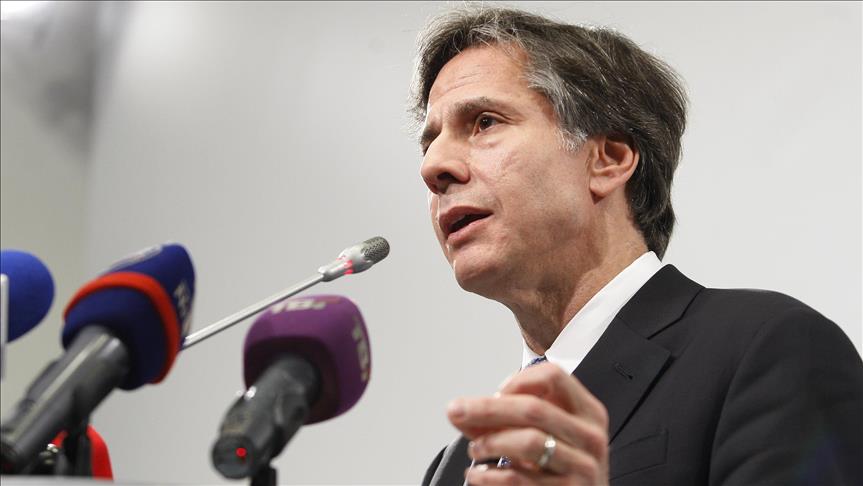 Anthony Blinken
Anthony Blinken
Washington DC
By Michael Hernandez
WASHINGTON
Neither Iraqi Kurdish peshmerga nor Shia militia will enter Mosul proper as Iraqi forces prepare to retake the city, the second in command at the State Department told lawmakers Thursday.
Hailing the highly anticipated offensive as the “culmination” of the counter-Daesh campaign in Iraq, Anthony Blinken told the Senate Foreign Relations Committee that the U.S. is seeking to develop a 15,000-strong Sunni Arab “hold force” to ensure order in the city once it falls.
“The core of the force that liberates Mosul will be the Iraqi security forces backed by the coalition with the support of the peshmerga,” he said. “The tribal elements that are being trained, equipped, brought on board with the goal of getting 15,000 of them will be predominantly be the holding force once the city is liberated."
U.S.-led anti-Daesh coalition spokesman, Air Force Col. John Dorrian, told reporters via video link from Iraq that the peshmerga will be involved in the effort "although the details of their involvement are still being worked out".
Daesh has held Iraq’s second largest city since the extremist group overran government forces in the summer of 2014, since making Mosul its de facto Iraqi capital.
The fight to retake the city is likely to be bitterly contested by Daesh, and will involve bloody close combat between the group and Iraqi forces.
The U.S.-led coalition estimates that Daesh has between 3,000 and 4,500 fighters from Iraq and abroad in the city.
The U.S. said last week that Daesh struck a vital neighboring airbase where American forces are preparing for the forthcoming offensive with a mustard-sulfur chemical attack.
U.S. officials are hoping to use Qayyarah air base, located just 65 kilometers (40 miles) from Mosul to launch close air support for Iraqi forces to help them gain a pivotal edge against Daesh in the city.
Turning to Syria, Blinken said the U.S. is working with Turkey to continue the campaign against Daesh in Syria, including the highly sought effort to oust the terror group from its Syrian capital, Raqqah.
He acknowledged that Ankara has been uncomfortable with the U.S.’s support for the YPG, saying, “it’s caused some tensions.
“But it has resulted in taking back Manbij, which was a critical transit point for Daesh in and out of Syria into Turkey, and out of Turkey,” he said. “We need to be able to work with effective actors on the ground in Syria. That’s what we’ve done, that’s what we’ll continue to do, but we also need to do it in a way that respects the concerns and interests of our Turkish allies.”
Turkey views the YPG as the Syrian affiliate of the PKK terror group, but Washington has resisted similarly labeling the group and has heavily relied upon it, under the banner of the Syrian Democratic Forces, to combat Daesh in northern Syria.
The violence in Syria was significantly dampened by a U.S.-Russian truce to halt the conflict, but it has since faltered as violence between the warring parties rekindled and government forces backed by Russian airpower renewed a campaign to oust rebels from Aleppo, Syria’s pre-war largest city.
Blinken said Russia has “reneged” on its commitments to reign in Syrian forces and that Moscow “is going to bear very significant consequences for the failure of this effort.
“Russia has a profound incentive in trying to make this work,” he said. “It can’t win in Syria. It can only prevent Assad from losing. If this now gets to the point where the civil war actually accelerates all of the outside patrons are going to throw in more and more weaponry against Russia.
“Russia will be left propping up Assad in an ever smaller piece of Syria,” said Blinken.
He said President Barack Obama has ordered U.S. agencies to review options to end the conflict, but gave no detail on what that might entail.








